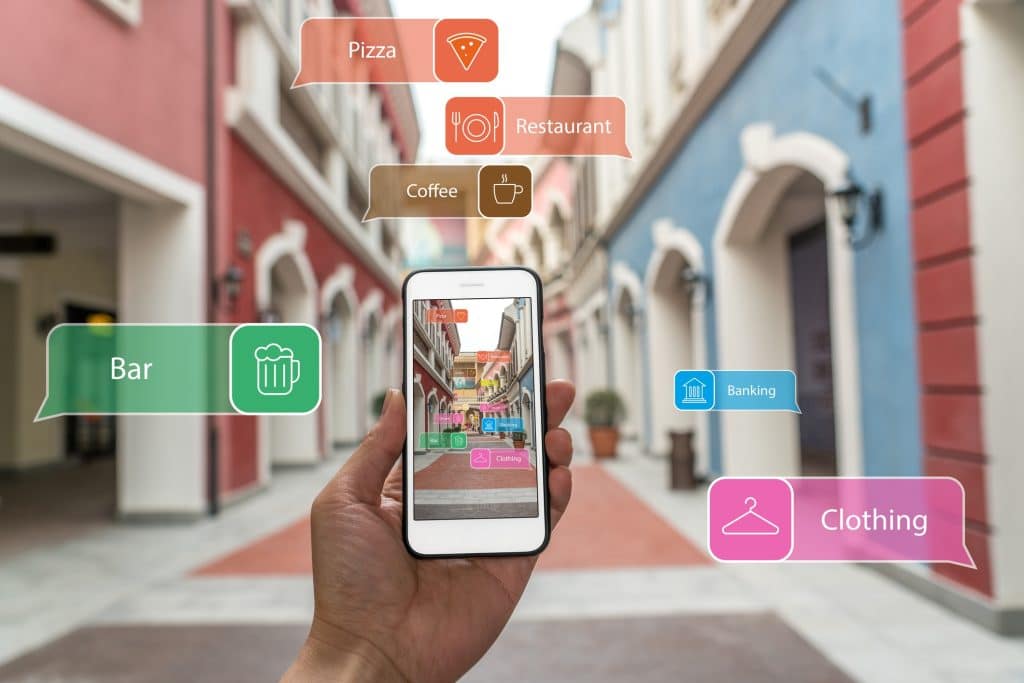Introduction
The landscape of mobile app development is rapidly evolving, and a key driver of this change is the integration of Augmented Reality (AR) and Virtual Reality (VR) technologies. These innovations are not just transforming the user experience but are also reshaping the strategies of cross platform mobile app development companies. This blog post explores the influence of AR and VR on the mobile app development industry, highlighting how augmented reality technology companies and virtual reality companies are contributing to this revolution.
AR and VR technologies are offering immersive experiences that were once thought impossible. The unique capabilities they provide have opened up new avenues for creativity and functionality in mobile applications. As a result, cross-platform mobile app development companies are increasingly incorporating these technologies into their projects. This integration is changing the way users interact with mobile applications, creating more engaging and interactive experiences.
The rise of AR and VR is also impacting the tools and platforms used for mobile application development. Mobile application development platforms are evolving to support these new technologies, providing developers with the resources they need to create cutting-edge apps. The integration of AR and VR is not just a trend but a significant shift in the mobile app development paradigm, one that is set to redefine the industry.
The Role of AR/VR in Enhancing User Experience
Transforming User Interactions
AR and VR technologies are revolutionizing the way users interact with mobile apps. By leveraging these technologies, cross-platform mobile app development companies are creating more intuitive and engaging user interfaces. AR, for instance, overlays digital information onto the real world, allowing for a seamless blend of virtual and physical elements. This integration enhances the user experience by making apps more interactive and engaging.
Virtual reality companies are also playing a significant role in this transformation. VR immerses users in a completely virtual environment, providing a level of engagement that traditional apps cannot match. This immersive experience is particularly beneficial for gaming and educational apps, where a high level of user engagement is crucial. As a result, VR is becoming an essential tool for developers looking to create highly engaging and interactive apps.

Enhancing Accessibility and Convenience
AR and VR technologies are not only improving user engagement but are also making apps more accessible and convenient. Augmented reality technology companies are developing solutions that help users interact with apps in more natural and intuitive ways. For example, AR can be used to provide real-time information overlays in navigation apps, making it easier for users to find their way around.
Similarly, VR is enhancing the accessibility of apps by providing immersive environments that can be accessed from anywhere. This is particularly useful for applications like virtual tours or remote training programs, where users can benefit from a realistic experience without the need for physical presence. These advancements are making mobile apps more user-friendly and accessible, further driving the growth of the mobile app industry.
AR/VR and Cross Platform Mobile App Development Companies
Streamlining Development Processes
Cross-platform mobile app development companies are leveraging AR and VR technologies to streamline their development processes. By using these technologies, developers can create apps that work seamlessly across multiple platforms, reducing development time and costs. This is particularly important in today’s market, where there is a growing demand for apps that are compatible with a wide range of devices.
The integration of AR and VR into mobile application development platforms is also facilitating cross-platform development. These platforms are providing developers with the tools they need to build AR and VR-enabled apps that can run on various operating systems. This not only simplifies the development process but also ensures that apps can reach a wider audience, regardless of the devices they use.
Enhancing App Performance and Reliability
Another significant benefit of integrating AR and VR into cross-platform development is the enhancement of app performance and reliability. Augmented reality technology companies are developing advanced algorithms that enable AR features to run smoothly on different devices. This ensures a consistent user experience across all platforms, which is crucial for maintaining user satisfaction.
Virtual reality companies are also contributing to this aspect by optimizing VR content for various hardware specifications. This optimization ensures that VR apps perform reliably on different devices, providing users with a high-quality experience. By focusing on performance and reliability, cross-platform mobile app development companies are able to deliver superior apps that meet the expectations of their users.
The Future of Mobile App Development with AR/VR
Pioneering New App Categories
The integration of AR and VR is not just enhancing existing app categories but is also pioneering new ones. Innovative applications that blend the physical and virtual worlds are emerging, thanks to the efforts of augmented reality technology companies. These new app categories are opening up unexplored markets and providing fresh opportunities for cross-platform mobile app development companies.
Virtual reality companies are also contributing to this trend by exploring new applications of VR technology. From virtual showrooms to immersive educational experiences, VR is enabling the creation of apps that were once thought impossible. This innovation is expanding the scope of mobile app development, paving the way for a future where the possibilities are limitless.
Driving Industry Growth and Innovation
The impact of AR and VR on the mobile app development industry extends beyond the creation of new app categories. These technologies are driving industry growth and innovation, as companies strive to stay ahead in a competitive market. Cross-platform mobile app development companies are investing in AR and VR to differentiate their offerings and provide unique value to their clients.
Moreover, mobile application development platforms are continuously evolving to support the latest AR and VR technologies. This evolution is fostering an environment of innovation, where developers are encouraged to experiment with new ideas and push the boundaries of what is possible. As a result, the mobile app development industry is experiencing rapid growth and transformation, fueled by the integration of AR and VR technologies.
The Challenges and Opportunities of AR/VR Integration
Navigating Technical Complexities
While the integration of AR and VR offers numerous benefits, it also presents significant challenges, particularly in terms of technical complexity. Cross-platform mobile app development companies must navigate these complexities to successfully implement AR and VR features. This includes dealing with issues such as platform compatibility, performance optimization, and user interface design.
Augmented reality technology companies are working to address these challenges by developing more advanced and user-friendly tools. These tools are making it easier for developers to incorporate AR features into their apps, reducing the technical barrier to entry. Similarly, virtual reality companies are focusing on making VR more accessible, with solutions that simplify the development process and enhance the user experience.
Expanding Market Opportunities
The integration of AR and VR is also opening up new market opportunities for mobile app developers. As these technologies become more mainstream, there is a growing demand for AR and VR-enabled apps across various industries. This is providing cross-platform mobile app development companies with the chance to explore new markets and expand their client base.
Moreover, the evolving capabilities of mobile application development platforms are enabling developers to create more sophisticated and feature-rich apps. This is attracting a wider range of clients, from small businesses to large corporations, all looking to leverage the benefits of AR and VR in their mobile applications. As a result, the integration of these technologies is not only driving innovation but also expanding the market opportunities for developers.
AR/VR and the Future of Cross-Platform Development
Setting New Standards in App Development
The integration of AR and VR is setting new standards in mobile app development. Cross-platform mobile app development companies are now expected to offer AR and VR capabilities as part of their services. This is raising the bar for what is considered a high-quality app, with users increasingly expecting immersive and interactive experiences.
Augmented reality technology companies and virtual reality companies are at the forefront of this shift, continuously pushing the boundaries of what is possible. Their innovations are not only enhancing the user experience but are also influencing the direction of the mobile app development industry. As these technologies become more integrated into mobile apps, they are setting new standards for functionality, engagement, and creativity.
Preparing for the Future
As we look to the future, it is clear that AR and VR will play a pivotal role in the evolution of mobile app development. Cross-platform mobile app development companies must prepare for this future by staying abreast of the latest trends and advancements in these technologies. This includes investing in research and development, as well as fostering a culture of innovation within their organizations.
Mobile application development platforms will also need to evolve to support the growing needs of developers working with AR and VR. This will involve providing more advanced tools and resources, as well as ensuring compatibility with a wide range of devices. By preparing for the future, the mobile app development industry can fully harness the potential of AR and VR, creating a new era of mobile applications that are more engaging, interactive, and innovative than ever before.

Conclusion
The impact of AR and VR on mobile app development is undeniable. These technologies are transforming the industry, offering new opportunities for innovation and growth. Cross-platform mobile app development companies are at the forefront of this transformation, leveraging AR and VR to create apps that are more engaging, interactive, and accessible. The future of mobile app development is bright, with AR and VR setting new standards for what is possible.
As we move forward, the integration of these technologies will continue to drive industry growth and innovation. Cross-platform mobile app development companies, augmented reality technology companies, and virtual reality companies will play a crucial role in shaping this future. By embracing these technologies, the mobile app development industry can create a new generation of apps that offer unparalleled user experiences.
The journey ahead is exciting, with AR and VR opening up a world of possibilities for mobile app development. As these technologies continue to evolve, they will redefine the way we think about mobile applications, setting the stage for a future where the lines between the physical and virtual worlds are blurred. The impact of AR and VR on mobile app development is just beginning, and the best is yet to come.
What is cross-platform mobile app development?
Cross-platform mobile app development is the practice of building mobile applications that can run on multiple operating systems, such as iOS and Android, using a single codebase.
What is the best platform to build a mobile app?
The best platform to build a mobile app is subjective and depends on your specific needs and preferences. Some popular options include:
Android Studio: Ideal for developing native Android apps.
Xcode: Suitable for building native iOS apps.
React Native: Allows you to develop cross-platform apps using JavaScript.
Flutter: Enables you to create cross-platform apps with a single codebase.
Xamarin: A popular choice for building cross-platform apps using C#.
Consider your technical expertise, target audience, project requirements, and development resources when choosing the platform.
What is the best programming language to develop cross-platform mobile applications?
Flutter.


